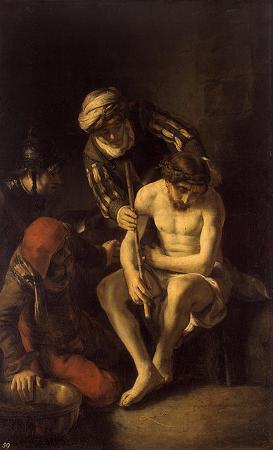Mocking of Christ. The mocking of Jesus occurred several times, after his trial and before his crucifixion according to the canonical gospels of the New Testament. It is considered part of Jesus' passion. According to the gospel narratives, Jesus had predicted that he would be mocked. The mocking of Christ took place in three stages: immediately following his trial, immediately following his condemnation by Pontius Pilate, and when he was being crucified. The New Testament narratives of Jesus being mocked are filled with irony, while the mockery focuses on Jesus' prophetic and kingly roles. After Jesus' condemnation by the Sanhedrin, some spat on him. He was blindfolded and beaten, and then mocked: Prophesy! Who hit you?. This was done by those men who held Jesus. The New International Version translates this as the men who were guarding Jesus, but Joel B. Green takes the phrase to refer to the Chief priests, the officers of the temple police, and the elders mentioned in verse 52. Green suggests that Jesus suffers the mockery that is typical of prophets, and that his suffering suggests his solidarity with God's agents who speak on God's behalf and are rejected. Susan R. Garrett sees Mark's inclusion of the mockery as an example of irony, since Jesus is indeed a prophet, at the very moment his prophecy that Peter would deny him was being fulfilled. The prophetic assignment is not always portrayed as positive in the Bible, and prophets were often the target of persecution and opposition. After his condemnation by Pontius Pilate, Jesus was flogged and mocked by Roman soldiers. They clothed him with a purple or scarlet robe symbolizing a royal gown since purple was a royal color, put a crown of thorns on his head symbolizing a royal crown, and put a staff in his hand symbolizing a scepter. They knelt before him and said, Hail, king of the Jews!. This was done as a mockery of Jesus' kingship. After this, they spat on him and struck him on the head with the staff repeatedly. Peter Leithart notes that at the end of the scene, the soldiers reverse the whole coronation with an anti-coronation. They spit in contempt instead of kneeling in reverence, pull the scepter from Jesus' hand and beat His crowned head with it, strip off the scarlet robe and replace it with Jesus' own robe. Leithart goes on to suggest that, at this point, the Romans remove the veil of irony and reveal what they really think about the Jews and their God. The crowning/de-crowning of a mock king is what Mikhail Bakhtin calls the carnivalesque. Carnivalesque expresses life drawn out of its usual rut and the reverse side of the world in which normally suppressed voices of the culture mock everyday social hierarchies and the voices of the status quo. The soldiers not only mock Jesus; they mock the whole notion of kingship modeled on this world. The irony is rich because the type of king they mock, one who lords over others with scepter, crown, and robe, is not the type of king Jesus is or the type of kingdom he brings. Their mockery speaks truth beyond what they could possibly know. Robert J. Miller suggests that the gospel account is deeply ironic since Jesus is exercising his kingship through submission and suffering: the Roman legionnaires have unwittingly furthered God's secret purposes by dressing Jesus up as a king. In fact, the irony operates on two levels. James L. Resseguie points out that there is verbal irony in the way the soldiers mock Jesus as a dismal failure and a pretend king as well as dramatic irony in that the readers know that the acclamation rings true in ways that the soldiers could not possibly understand. Luke 23:11 also mentions that Herod and his soldiers ridiculed and mocked him. Jesus was also mocked while he was on the cross. According to Mark 15:29-30, this was done by those who passed by and hurled insults at him and told him to come down from the cross. Mark 15:31-32 points out thatthe chief priests and the teachers of the law also mocked him among themselves, saying: He saved others, but he can't save himself! Let this Messiah, this king of Israel, come down now from the cross, that we may see and believe. Finally, those crucified with Jesus also heaped insults at him. Luke 23:36-37 mentions mocking by Roman soldiers: The soldiers also mocked him, coming up and offering him sour wine, and saying, If you are the King of the Jews, save yourself!. In Matthew 27:42 people, priest and the elders mock Jesus, and shout at him while he is hanging on the cross: He saved others; let Him save Himself if He is the Christ, the chosen of God.
more...













